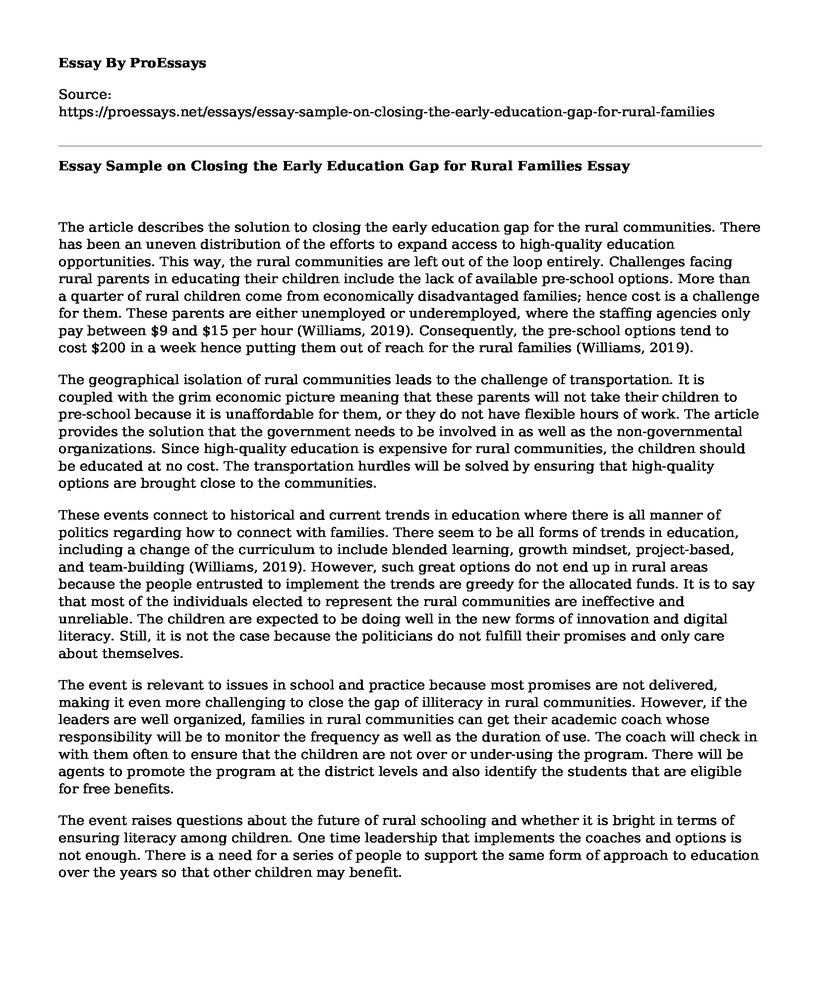The article describes the solution to closing the early education gap for the rural communities. There has been an uneven distribution of the efforts to expand access to high-quality education opportunities. This way, the rural communities are left out of the loop entirely. Challenges facing rural parents in educating their children include the lack of available pre-school options. More than a quarter of rural children come from economically disadvantaged families; hence cost is a challenge for them. These parents are either unemployed or underemployed, where the staffing agencies only pay between $9 and $15 per hour (Williams, 2019). Consequently, the pre-school options tend to cost $200 in a week hence putting them out of reach for the rural families (Williams, 2019).
The geographical isolation of rural communities leads to the challenge of transportation. It is coupled with the grim economic picture meaning that these parents will not take their children to pre-school because it is unaffordable for them, or they do not have flexible hours of work. The article provides the solution that the government needs to be involved in as well as the non-governmental organizations. Since high-quality education is expensive for rural communities, the children should be educated at no cost. The transportation hurdles will be solved by ensuring that high-quality options are brought close to the communities.
These events connect to historical and current trends in education where there is all manner of politics regarding how to connect with families. There seem to be all forms of trends in education, including a change of the curriculum to include blended learning, growth mindset, project-based, and team-building (Williams, 2019). However, such great options do not end up in rural areas because the people entrusted to implement the trends are greedy for the allocated funds. It is to say that most of the individuals elected to represent the rural communities are ineffective and unreliable. The children are expected to be doing well in the new forms of innovation and digital literacy. Still, it is not the case because the politicians do not fulfill their promises and only care about themselves.
The event is relevant to issues in school and practice because most promises are not delivered, making it even more challenging to close the gap of illiteracy in rural communities. However, if the leaders are well organized, families in rural communities can get their academic coach whose responsibility will be to monitor the frequency as well as the duration of use. The coach will check in with them often to ensure that the children are not over or under-using the program. There will be agents to promote the program at the district levels and also identify the students that are eligible for free benefits.
The event raises questions about the future of rural schooling and whether it is bright in terms of ensuring literacy among children. One time leadership that implements the coaches and options is not enough. There is a need for a series of people to support the same form of approach to education over the years so that other children may benefit.
Reference
Williams, T. (2019). Closing the early education gap for rural families. Smart Brief. Retrieved from https://www.smartbrief.com/original/2019/05/closing-early-education-gap-rural-families
Cite this page
Essay Sample on Closing the Early Education Gap for Rural Families. (2023, Mar 27). Retrieved from https://proessays.net/essays/essay-sample-on-closing-the-early-education-gap-for-rural-families
If you are the original author of this essay and no longer wish to have it published on the ProEssays website, please click below to request its removal:
- Essay Sample on English Writing
- My Sociological Autobiography Essay
- Shang War Chariots Essay Example
- Essay on Gaining Language Skills for Personal and Community Growth Through ESL
- Essay Example on Creating an Inclusive & Nurturing Learning Environment for Students
- Essay Example on Proper Decision Making: Vital for Enhancing Performance
- My Dream Vacation - Free Essay Sample







